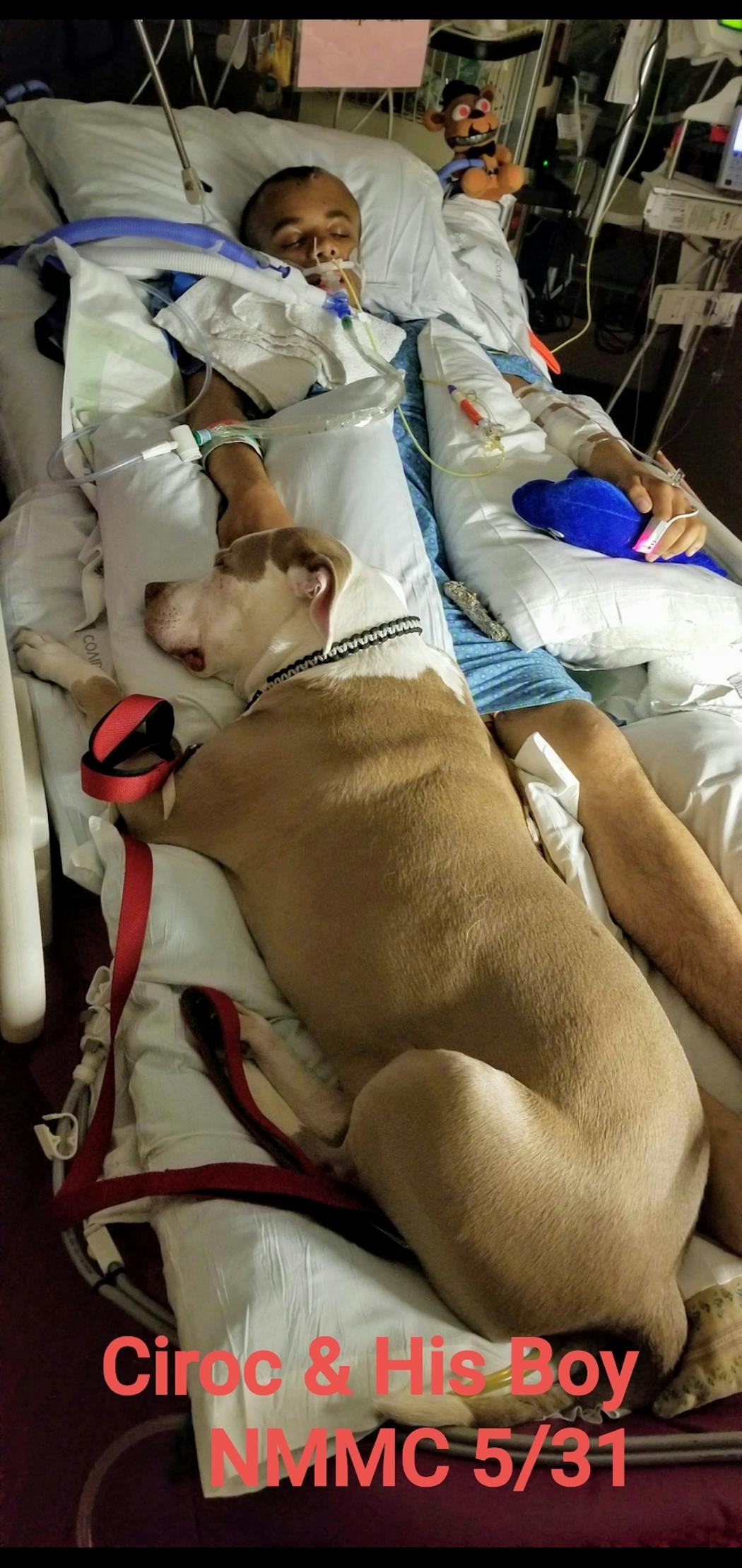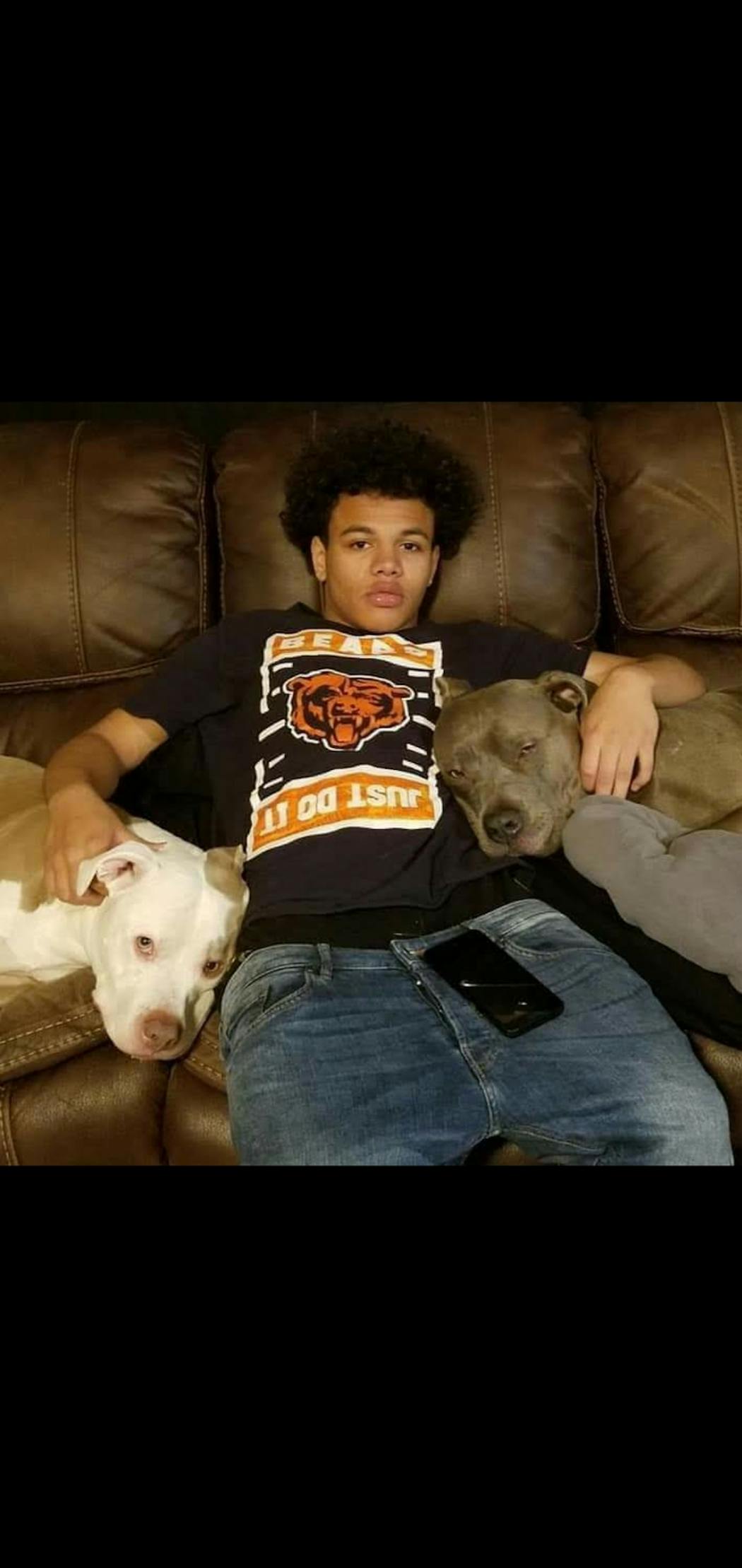For months, Jennifer LeMay's life has been measured in ambulance trips taken and hospital lobbies paced on late nights.
Ever since her son was shot outside a north Minneapolis gas station, she gets up early most mornings to make the 45-minute drive to the hospital so she can be there when he wakes and tend to his needs.
"It's medication, it's repositioning, it's making sure his skin doesn't break down, making sure that he's clean, that he's safe," LeMay said. "We keep stuffed animals in his hands so that he didn't end up with atrophy."
Despite doctors' suggestions, she couldn't bring herself at first to take him off life support in the aftermath of the shooting. Caleb Livingston will turn 17 in January, but, she says, he'll always be her little boy.
Thanks to advances in medical care, more gunshot victims are surviving serious injury than ever before. But the road to recovery can leave their families heartsick and searching for answers, while facing severe financial straits. That's particularly true among those living in poorer neighborhoods where most of the city's shootings occur. LeMay's bill from North Memorial Medical Center, where her son stayed in the ICU for 33 days, totaled $545,776.69 and set off a monthslong fight with her insurance company over who would pay.
"I didn't ask for my child to be shot," she said. "So I have literally liquidated everything that I have stored away for savings."
The toll of gun violence is often measured in homicides, up in both Minneapolis and St. Paul this year. But with the squeeze of a trigger, mother and son joined the ranks of the dozens of people who are shot and survive. What has already been a nightmare for the family now threatens to plunge them into poverty, said LeMay, formerly of Minneapolis and now living in the Chicago area.
True costs of gun violence
A 2017 report by the Minnesota Coalition for Common Sense, a gun-control advocacy group, found that the economic costs of gun violence in Minnesota exceed $764 million, for things ranging from medical bills to lost time at work, with taxpayers shouldering much of the burden.
"When the reduced quality of life attributable to pain and suffering ($1.4 billion) is considered, the estimate rises to $2.2 billion per year," the report said. "While this number is staggering, it actually understates the true cost of gun violence in Minnesota — it doesn't incorporate significant, yet difficult-to-measure costs, including lost business opportunities, lowered property values, and reductions in the tax base."
Livingston is the second oldest of LeMay's four biological children and the only boy, which made the two that much closer. He was in Minneapolis, visiting from Illinois, on May 14 when he stopped to fill his tank at the Full Stop gas station at 1818 N. Lowry Av. There was a brief confrontation, then gunfire, and he took a bullet to the head.
The shooter remains at large.
To relieve pressure on Livingston's swollen brain, surgeons had to remove a large portion of his skull. An ICU doctor later predicted he would spend his life in a vegetative state. After being declared brain dead, he was taken off life support. Somehow, LeMay says, he survived.
After seeking a second opinion, LeMay had him transferred to Chicago's Lurie Children's Hospital.
Back home in Illinois, most of Livingston's hospital bills are covered under the state's Medical Assistance program, LeMay says. But between gas, parking and tolls, she estimates she spends another $1,800 a month on driving to and from the hospital every day.
In early August, her son's condition improved enough that he was released from Lurie to a transitional-care facility. But LeMay barely had time to exhale before a cascade of complications put him right back a week later.
She's still getting used to the sight of her normally energetic son lying motionless in a hospital bed with tubes protruding from his body.
Before, she never had to worry about him staying cooped up in the house: He was always outside, often shooting hoops with friends.
She hates that she'll never again see him burst through the front door, his clothes soaked with sweat from hours of racing four-wheelers and dirt bikes in Kankakee, Ill. Back then, Livingston looked after his siblings while LeMay, a single mother, worked. Now, one of his sisters is taking classes to make her eligible for "ventilator duty" when he gets out of the hospital.
LeMay, a nurse, hasn't gone back to her job caring for the elderly since the shooting.
She says she's recently seen progress in her son — eyes open, eating ice cream and sucking on lollipops, responsive to voices and following what neurologists call "purposeful commands." Some days, he can muster a thumbs-up sign.
"We can see little things that Caleb is still doing where it shows that, 'Hey, I'm still here, I'm fighting,' " LeMay said.
Manu Lewis, who works with Twin Cities youth who are at risk of joining gangs, said little thought is often given to the secondary trauma that mothers experience while caring for a child who has been shot.
"We men don't realize that it's an entirely different feeling when something that's come from your body is laying in a hospital bed, clinging to life," he said.
Shooting remains unsolved
In many ways, LeMay says, Livingston was a "typical teenager," with a knack for getting into trouble. But, she said, he wasn't a gang member who had somehow brought death on himself, as some have implied on social media and elsewhere.
"It was a stereotype, 'Black male in the ghetto, who was shot, it had to be gang violence,' " she said, with some anger.
Police have not named any suspects or revealed a motive in her son's shooting. LeMay said they have stopped responding to her calls and texts.
This is not the first time she's been skeptical of police investigations.
Two summers ago, LeMay found herself at the center of a viral news story after a Minneapolis police officer shot and injured her two service dogs, Ciroc and Rocko, after hopping her backyard fence while responding to a home burglary alarm. She sued the Police Department in federal court in September, alleging that police conspired to cover up the incident. The lawsuit is pending.
A police spokesman said Thursday that the department couldn't comment on the shooting, an "open and active" investigation.
In the meantime, LeMay is pouring herself into caring for Livingston, even while knowing that his mind may never fully heal and financial pressures mount.
"Being a mom, you ask yourself: 'Am I doing the right thing?' " she said. "And I tell myself, as long as my son is fighting, we're fighting right behind him."

Edina's sophomore two-sport standout on recruiting: 'It's gotten a little busy'
![Greg Ketchum put a fresh crate of cherries out for sale at the Patnode's stand, which workers say is the oldest at the farmers market. ] ANTHONY SOUFF](https://arc.stimg.co/startribunemedia/PXAYPLUT6O67HYOFFC6PNPVTSM.jpg?h=91&w=145&fit=crop&bg=999&crop=faces)
Minneapolis Farmers Market pares back hours for 2024 season
Body camera video shows Minnetonka man repeatedly shooting at deputies before dying in firefight
Oakdale issues warning after coyote attacks dog in nature preserve



